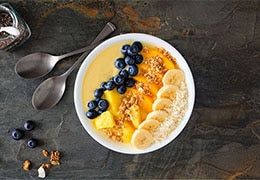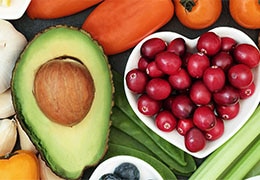Vitamin E is an essential component of a healthy and balanced diet that you should be aware of. Not only can it help support your immunity, but it also protects the skin from cellular damage. This article aims to ensure you understand the many vitamin E functions and why it should be part of your daily routine.
Have you ever wondered what actually goes into your body when you eat a meal? There's so much to consider: proteins, carbs, fats, vitamins, minerals, the list goes on. One vitamin that often flies under the radar is vitamin E. This nutrient is the key to keeping our bodies strong and healthy. It can help with everything from boosting our immune systems to protecting our cells from damage. And the best part? You can find it in loads of tasty foods like nuts and seeds. In this article, we’ll explore the many vitamin E benefits, their daily requirements and more.
What is Vitamin E?
So, what is vitamin E? Vitamin E, a fat-soluble nutrient, can be found in various foods. Like other vitamins that dissolve in fat, it requires some fat in the digestive system in order to be absorbed.
The term "vitamin E" actually refers to a group of eight antioxidants: four tocopherols (α-, β-, γ-, and δ-) and four tocotrienols (α-, β-, γ-, and δ-). Among these, α-tocopherol is the form of vitamin E that the human body actively maintains and is most prevalent in blood and tissues.
Functions and Health Benefits of Vitamin E in Your Body
- High Antioxidant Activity: Vitamin E in the body functions as an antioxidant, safeguarding cells against harm from free radicals. These radicals are destructive substances that are formed during the conversion of food into energy and are also present in the environment through sources like cigarette smoke, air pollution, and sunlight.
- Protects from sun damage: Research suggests that as an antioxidant, vitamin E can protect your skin from sun damage by absorbing harmful UVB rays and minimising inflammatory responses such as swelling, reddening, and thickening.
- Boosts vision: Vitamin E also plays a major role in maintaining the health of our eyes, and can help protect them from age-related macular degeneration and even cataracts. This is one of the most important vitamin E functions, especially for elderly people.
- Immune system booster: Furthermore, vitamin E plays a major role in strengthening the immune system, aiding in the defence against bacteria and viruses.
- Helps manage symptoms of kidney or liver disease: It helps widen blood vessels, that can help clots from forming within them, which is often seen in people with liver or kidney disease. Evidence also suggests that vitamin E may help improve symptoms of certain liver diseases.
- Aids with vital bodily functions: Our cells rely on vitamin E for communication and the execution of vital functions.
Daily Recommendations for Vitamin E
Getting enough vitamin E every day is important to meet your body’s needs. The daily recommended intake of vitamin E for adult men and women is 7.5-10 mg. It is worth noting that any excess vitamin E is stored for later use within the body.
Food Sources of Vitamin E
Discover the power of vitamin E in foods! Boost your intake by enjoying a variety of delicious options:
- Nuts and seeds are mighty sources of vitamin E.
- This includes peanuts, hazelnuts, and almonds. For a savoury twist, sprinkle some of these seeds or nuts on top of your salads or smoothies.
- Vegetable oils like sunflower and safflower oils are packed with vitamin E.
- Some vitamin-rich vegetables like spinach and broccoli provide some amount of vitamin E.
- Enhance your breakfast and snacks with vitamin-enriched foods like cereals, fruit juices, margarine, and spreads. Just check the labels to find the ones with vitamin E.
Since each person's unique body chemistry can handle different amounts of nutrients, consult your doctor or nutritionist before starting any major supplement strategies.
Conclusion
To sum up, understanding the importance of vitamin E can help you make sound dietary choices. As a powerful antioxidant, it helps promote healthy skin, improves eye health, supports immune system functionality and fights oxidative stress. It is always recommended to eat a nutritious, balanced diet that includes sources of vitamin E such as nuts, eggs, fortified cereals and vegetable oils. Take a look at your current daily vitamin intake and see if adding something like vitamin E could bring you one step closer to improved vitality and energy levels.












